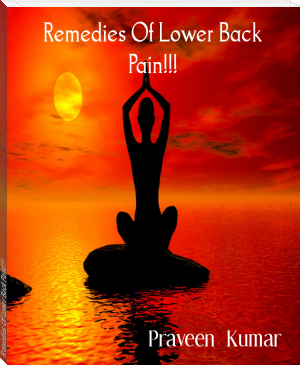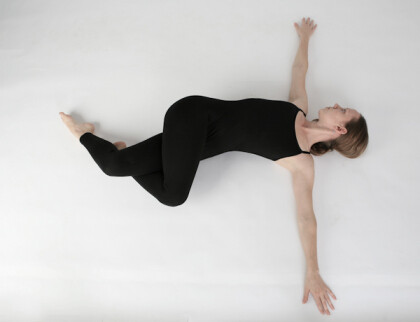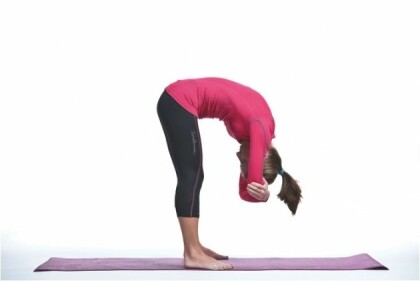Remedies Of Lower Back Pain!!! by Praveen Kumar (famous ebook reader .txt) 📖

- Author: Praveen Kumar
Book online «Remedies Of Lower Back Pain!!! by Praveen Kumar (famous ebook reader .txt) 📖». Author Praveen Kumar
Low back pain (LBP) is a common disorder involving the muscles, nerves, and bones of the back. Pain can vary from a dull constant ache to a sudden sharp feeling. Low back pain may be classified by duration as acute (pain lasting less than 6 weeks), sub-chronic (6 to 12 weeks), or chronic (more than 12 weeks). The condition may be further classified by the underlying cause as either mechanical, non-mechanical, or referred pain. The symptoms of low back pain usually improve within a few weeks from the time they start.

The treatment of acute nonspecific low back pain of rapid onset is typically with simple pain medications and the continuation of as much normal activity as the pain allows. Medications are recommended for the duration that they are helpful, with paracetamol (also known as acetaminophen) as the preferred first medication. A number of other options are available for those who do not improve with usual treatment.
Lower back pain is one of the most common reasons for visiting the doctor. The lower back is made up of the vertebrae of the spine, ligaments and muscles. Intervertebral discs are found in the spine, which are a sort of cushion made up of cartilage. It fits perfectly between two vertebrae. Any kind of injury or disease of these discs in lower back, muscles and ligaments can cause back pain. The risk of lower back injury is higher in people who are obese, who have a poor posture or weak back and abdominal muscles. Almost everyone will experience lower back pain once in their life time. Due to a poor diet and lack of exercise this risk can increase by the day. Relieving lower back pain with Yoga is the best option.
Causes Of Back Pain.
Low back pain is not a specific disease but rather a complaint that may be caused by a large number of underlying problems of varying levels of seriousness.
There is no particular cause for lower back pain. However, muscle or ligament strain is seen as the most common cause. If you experience back pain suddenly it is a sign of a muscle tear, disc problem or sprained ligament.

Women may have acute low back pain from medical conditions affecting the female reproductive system, including endometriosis, ovarian cysts, ovarian cancer, or uterine fibroids. Nearly half of all pregnant women report pain in the lower back or sacral area during pregnancy, due to changes in their posture and center of gravity causing muscle and ligament strain.

Medical problems, like stomach problems (appendicitis, ulcers) and gall bladder disease can lead to back pain. Back pain can also be caused without any kind of injury. These conditions include pneumonia, kidney infections, infection of the spine and tumors. The pain which is worse in the morning and seems to reduce by movement and stretching is a result of muscle injury. Lower back pain which is worse at night and not relieved by exercise can be a “referred pain” that spreads to the back from other organs. This condition can also be a result of a bone problem. The pain that can be felt all the way down to the back of one or both of your legs is a sign of sciatica. When the sciatic or other spinal nerve is compressed, it will result in increased pain while sneezing, coughing or straining.
Relieving back pain is now much easier with yoga poses. These lower back exercises will help you strengthen your back. They do not just relieve your lower back from pain, but they also help to prevent back pain in future. Whether you are trying to relieve or prevent your lower back from pain, try some great lower back yoga stretches. If you are having severe back ache, consult the doctor before trying these yoga poses.

1.Marjariasana (Cat-Cow)
This is the simplest pose of the sequence, and the best to do if you only have time for one posture. Cat-Cow stretches your spine both ways and gets it warmed up for the rest of the sequence.

2. Adho Mukha Svanasana (Downward Facing Dog)
This ‘classic’ yoga pose is a great posture for lower back pain as it targets the hamstrings—which are often tight in those with lower back pain, the back extensors—or the large muscles on your lower back, and it allows you to lengthen and stretch out your entire spine.

Stand on four limbs, such that your body forms a table-like structure. Exhale and gently lift your hips and straighten your elbows and knees. You need to ensure your body forms an inverted ‘V’. Your hands should be in line with your shoulders, and your feet in line with your hips. Make sure that your toes point outwards. Now, press your hands into the ground and lengthen your neck. Your ears should touch your inner arms, and you should turn your gaze to your navel. Hold for a few seconds, and then, bend your knees and return to the table position.
3. Pigeon Pose
This pose can be a savior for those whose back pain is caused by tight hips. Pigeon pose targets the hip flexors, iliopsoas muscles, and hip rotators, which when tight can all contribute to a stiff and sore lower back.

1. From the Table or Down Dog, slide the right knee forward between the hands and let the right foot slide over to the left. Slide the left leg back, lowering the hips towards the floor.
2. Press down into the palms or fingertips, inhale and reach the crown of the head up, lengthening the spine. Exhale and sink the hips down into the floor. Roll the shoulders down and back and press and lean forward through the chest.
3. Move as deep into the posture as you can while still maintaining full deep breathing. Breathe and hold for 3-6 breaths.
4. To release: support your weight with the hands as you slide the right knee back into Table or step the right foot back into Down Dog.
5. Repeat on other side.
4. Standing Forward Bend
Having short, tight hamstrings is something that many who suffer with lower back pain have in common. This pose will both lengthen your hamstrings and release your lower back.

1. From Mountain pose exhale forward hinging at the hips. Bend the knees enough to bring the palms flat to the floor and the head pressed against the knees.
2. Feel the spine stretching in opposite directions as you pull the head down and in and press the hips up. Work on straightening the legs to deepen the stretch in the backs of the legs.
3. Breathe and hold for 4-8 breaths, actively pressing the belly into the thighs on the inhalation.
4. To release: bend the knees keeping the back straight, inhale the arms out to the sides and inhale the arms and torso up back into Mountain pose.
5. Supine Twist
This relaxing pose will release your lower back and increase overall spinal flexibility at the same time.

1. Lying on your back, bring your arms out to the sides with the palms facing down in a T position. Bend both knees into the chest.
2. Exhale drop both knees over to the left side of your body, twisting the spine and low back. Slide the knees as close to the left arm as possible. Look at the right finger tips.
3. Keep the shoulders flat to the floor, close the eyes, and relax into the posture. Let gravity pull the knees down, so you do not have to use any effort in this posture.
4. Breathe and hold for 6-10 breaths.
5. To release: inhale and roll the hips back to the floor.
6. Repeat on other side.
6. Wall Plank
You need to stand in front of the wall. Reach the wall with your hands and straighten them. Flatten your palms on the wall. Bend forward with your head facing downward. Lengthen your spine by stretching back as much as possible. You will come into an L shape. You may feel pain near the lower back, if you do bend your knees. Try to maintain the spinal stretch for at least 2 minutes. Breath deeply as you stretch your back.

7. Fists Forward Bend
You can now come back into standing position. Your feet should be hip-width apart. Bend your knees slightly and bend yourself over your legs. Bend as much as you can till your tummy touches your thighs. Make your hands into fists and place them on the opposite creases of the elbow. Relax all your body muscles and hold your fists tight. Take 10 deep breaths in this position. You will release more tension from the back with every breath. Breathing exercises are extremely helpful in melting belly fat.

8. Spine Lengthening
You need to sit in a comfortable position. Try placing a mat on the floor and sit cross legged (you can also sit on your bed, if you like). Your back should be straight and yours shoulders should be relaxed. You





Comments (0)